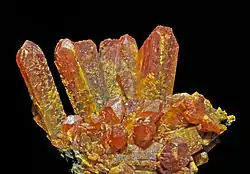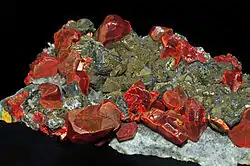雄黄
See also: 雄黃
Chinese
| For pronunciation and definitions of 雄黄 – see 雄黃 (“realgar, an arsenic sulfide”). (This term, 雄黄, is the simplified form of 雄黃.) |
Notes:
|
Japanese
Etymology 1

雄黄 (yūō, oō): a sample of the mineral orpiment.
| Kanji in this term | |
|---|---|
| 雄 | 黄 |
| ゆう Grade: S |
おう Grade: 2 |
| on’yomi | |
| Alternative spelling |
|---|
| 雄黃 (kyūjitai) |
/juːwau/ → /juːwɔː/ → /juːoː/
From Middle Chinese compound 雄黃/雄黄 (hjuwng hwang, literally “male + yellow”), indicating the mineral realgar, in contrast to 雌黄 (tsiɛ hwang, literally “female + yellow”), indicating the mineral orpiment.
Due to similarities between the two minerals, when the term was borrowed into Japanese, the meaning changed from realgar to orpiment.
Usage notes
This is the most common reading for this kanji compound.
Synonyms
- 石黄 (sekiō)
- 雌黄 (shiō) (rare)
Etymology 2
| Kanji in this term | |
|---|---|
| 雄 | 黄 |
| お Grade: S |
おう Grade: 2 |
| yutōyomi | |
| Alternative spelling |
|---|
| 雄黃 (kyūjitai) |
/wowau/ → /owɔː/ → /ooː/
Compound of 雄 (o, “male”, from Old Japanese) + 黄 (ō, “yellow”, from Middle Chinese).
Synonyms
- 石黄 (sekiō)
- 雌黄 (shiō) (rare)
Etymology 3

雄黄 (kini): a sample of the mineral realgar.
| Kanji in this term | |
|---|---|
| 雄 | 黄 |
| Grade: S | Grade: 2 |
| irregular | |
| Alternative spelling |
|---|
| 雄黃 (kyūjitai) |
From Old Japanese. Compound of 黄 (ki, “yellow”) + 丹 (ni, “earth, reddish earth”). The kanji are ateji, borrowed from the Chinese term.
Cognate and homophone of 雌黄 (kini, “orpiment”). Only differentiated by spelling.
Pronunciation
- (Irregular reading)
- IPA(key): [kʲiɲ̟i]
Synonyms
- 鶏冠石 (keikanseki) (more common)
This article is issued from Wiktionary. The text is licensed under Creative Commons - Attribution - Sharealike. Additional terms may apply for the media files.